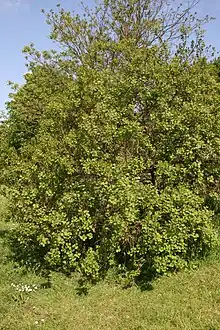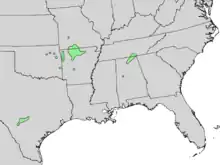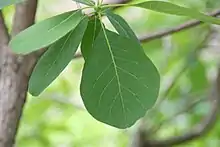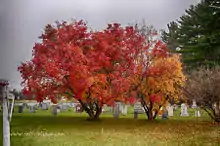| Cotinus obovatus | |
|---|---|
 | |
| Cotinus obovatus at Aarhus Botanical Gardens | |
| Scientific classification | |
| Kingdom: | Plantae |
| Clade: | Tracheophytes |
| Clade: | Angiosperms |
| Clade: | Eudicots |
| Clade: | Rosids |
| Order: | Sapindales |
| Family: | Anacardiaceae |
| Genus: | Cotinus |
| Species: | C. obovatus |
| Binomial name | |
| Cotinus obovatus Raf. | |
 | |
| Natural range of Cotinus obovatus | |
Cotinus obovatus syn. C. americanus, the American smoketree,[2] chittamwood or American smokewood, is a rare species of flowering plant in the genus Cotinus of the family Anacardiaceae, native to scattered locations in Oklahoma, Texas, Arkansas, Missouri, Alabama and Tennessee. It is a deciduous, conical shrub growing to 10 m (33 ft) tall by 8 m (26 ft) broad, with oval leaves up to 12 cm (5 in) long. It produces panicles of pink-grey flowers in summer, and its foliage turns a brilliant scarlet in autumn; considered by many to be the most intense fall color of any tree. The smokey effect derives from the clusters of hairs on the spent flower stalks.[3] It is highly sought after and cultivated in botanical gardens worldwide.[4][5] It is dioecious, with male and female flowers on separate plants.[6]
The Latin specific epithet obovatus means "in the shape of an inverted egg", and refers to the broadly oval shape of the leaves. The heartwood is a bright yellow. The species does not appear to be in danger of facing extinction in the wild.[1]



References
- 1 2 IUCN SSC Global Tree Specialist Group.; Botanic Gardens Conservation International; et al. (BGCI) (2020). "Cotinus obovatus". IUCN Red List of Threatened Species. 2020: e.T152909726A152909728. doi:10.2305/IUCN.UK.2020-1.RLTS.T152909726A152909728.en. Retrieved 20 November 2021.
- ↑ USDA, NRCS (n.d.). "Cotinus obovatus". The PLANTS Database (plants.usda.gov). Greensboro, North Carolina: National Plant Data Team. Retrieved 17 January 2016.
- ↑ "Cotinus obovatus". Missouri Botanical Garden. Retrieved 20 July 2013.
- ↑ RHS A-Z encyclopedia of garden plants. United Kingdom: Dorling Kindersley. 2008. p. 1136. ISBN 978-1405332965.
- ↑ "RHS Plant Selector - Cotinus obovatus". Archived from the original on 18 August 2020. Retrieved 20 July 2013.
- ↑ Tripp, Kim E. (1994). "Considering Cotinus" (PDF). Arnoldia: 21–30.
External links
 Media related to Cotinus obovatus at Wikimedia Commons
Media related to Cotinus obovatus at Wikimedia Commons
